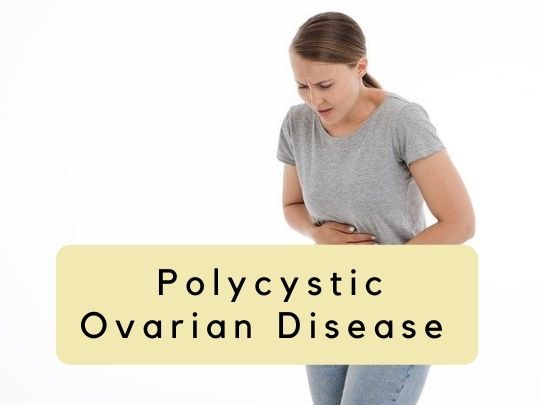
Direct go to
POLYCYSTIC OVARIAN DISEASE (PCOD)
Polycystic Ovarian Disease is a female health condition characterized by the formation of multiple cysts in the ovaries (polycystic) due to hormonal imbalances. The disease, affecting women of reproductive age (15-45 years), is a major cause of infertility and menstrual irregularities worldwide.
Normally, ovaries release a mature egg every month into the uterus (ovulation), for fertilization with the male sperm. If the egg is not fertilized, it breaks down and results in menstruation in due course. The hormones that regulate the cycle are estrogen, progesterone, Follicle-stimulating hormone (FSH), and Luteinising hormone (LH). Ovaries produce estrogen, progesterone, and a small number of androgens i.e. the male sex hormone while FSH and LH are produced by the pituitary gland. In PCOD, the balance of these hormones is disturbed leading to over-production of the male hormone and less progesterone. This disturbs the natural monthly cycle resulting in irregular, missed, or prolonged periods. Small, fluid-filled sacs or cysts form in the ovaries that carry immature eggs.

Causes of Polycystic Ovarian Syndrome
- Genetics: A family history of PCOD predisposes one to the disease.
- Excess Insulin: Excess production of sugar-controlling hormone insulin can increase the production of androgens thereby, affecting ovulation.
- Excess androgens: Increased production of male hormones is the leading cause of PCOD-related symptoms such as acne, facial hair growth, menstrual irregularities, etc.
Symptoms of Polycystic Ovarian Syndrome
Also known as Polycystic Ovarian Syndrome (PCOS), the condition is not always symptomatic and may be diagnosed when there is difficulty conceiving. In other cases, the following symptoms may be presented:
- Missed or irregular menses: Due to the overpowering androgens, the normal menstrual cycle may be disrupted and thus, females with PCOS may have less than 8 periods a year.
- Heavy or prolonged menses: The menses that may appear could be heavy or prolonged due to the shedding of the unusually thick endometrial lining that builds up over time.
- Masculine features: Appearance of masculine hair growth on the face, chest, or back known as hirsutism, severe acne, or baldness.
- Weight gain
- Skin tags or darkening: Dark or excess skin in the creases of the body such as under the breasts, on the neck, armpits, groin, etc.
- Depression or mood changes
- Pain in the lower abdomen
- Infertility
- Headache
- Trouble sleeping
- Cysts in the ovaries or enlarged ovaries
Diagnosis of Polycystic Ovarian Syndrome
A pelvic examination by a gynecologist, ultrasound imaging as well as PCOD blood tests to check levels of hormones can help reach the diagnosis of PCOD/PCOS. In certain cases, blood tests to check cholesterol levels and glucose tolerance may be required.
Treatment of Polycystic Ovarian Syndrome
- Medications to regulate the menstrual cycle such as birth control pills or other hormonal pills may be prescribed. Diabetes drugs such as Metformin may be given to control insulin levels that help bring androgens down.
- Lifestyle modifications to reduce weight and control sugar intake.
- Hair removal by electrolysis, laser, or topical applications.
- Surgery: Ovarian drilling may be done to brush off the thickening of the ovaries and promote ovulation though the procedure is only effective for a few months.
- In-vitro fertilization (IVF) may be recommended for females unable to conceive due to PCOS.
Complications of Polycystic Ovarian Syndrome
- Women with PCOD are at greater risk of complications during pregnancy such as gestational diabetes, premature delivery, miscarriage, etc.
- Weight gain associated with PCOS predisposes one to hypertension, diabetes, heart disease, high cholesterol, or other metabolic disorders.
- Endometrial cancer: The non-shedding of the uterine lining every month due to missed periods can result in a thickened uterine lining which increases the risk for endometrial cancer.
